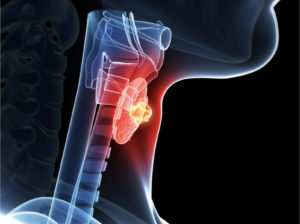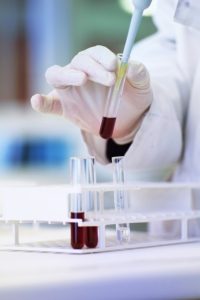Bay Biosciences provides high quality, clinical grade bio-specimens, cryogenically preserved sera (serum), plasma and peripheral blood mononuclear cells (PBMC) biofluid samples from patients diagnosed with Graves’ Disease.
The sera (serum), plasma and PBMC biofluid specimens are processed from patient’s peripheral whole-blood using customized collection and processing protocols. The Graves’ disease bio-specimens are collected from unique patients diagnosed with Graves’ disease and are provided to a valued pharmaceutical customer for research, diagnostics, discovery and drug development.
Detailed clinical data, cold Graves’ disease patients history, symptoms, complete blood count (CBC), elevated biomarker levels, genetic and metabolic information, histopathological findings, annotations associated with Graves’ disease patient’s specimens is provided to a valued customer for research, development and drug discovery. The Graves’ disease sera (serum), plasma and peripheral blood mononuclear cells (PBMC) biofluid are processed from patients peripheral whole-blood using customized collection and processing protocols.

Graves’ Disease Overview
Graves’ disease is an autoimmune disease. It causes the thyroid gland to create too much thyroid hormone in the body. This condition is known as hyperthyroidism or over active thyroid. Hyperthyroidism (overactive thyroid) occurs when your thyroid gland produces too much of the hormone thyroxine. Hyperthyroidism can accelerate your body’s metabolism, causing unintentional weight loss and a rapid or irregular heartbeat. The thyroid is a small, butterfly shaped gland in the front of your neck. Thyroid hormones control how your body uses energy, so they affect nearly every organ in your body, including the way your heart beats.
Graves’ disease is one of the most common forms of hyperthyroidism in the United States. Graves disease affects about 1 in 200 people. The disease occurs more often in women than in men, which may be related to hormonal factors. In Graves’ disease, the patients immune system creates antibodies known as thyroid-stimulating immunoglobulins. These antibodies then attach to healthy thyroid cells. They can cause the thyroid to create too much thyroid hormone. Thyroid hormones affect many aspects of the body. These can include the nervous system function, brain development, body temperature, and other important elements.
If left untreated, hyperthyroidism can cause serious problems with the heart, bones, muscles, menstrual cycle, and fertility. During pregnancy, untreated hyperthyroidism can lead to health problems for the mother and baby. Graves’ disease also can affect your eyes and skin. Hyperthyroidism may also cause weight loss, anxiety, jitteriness, irritability, depression, and mental or physical fatigue.
Causes of Graves’ Disease
Graves disease is thought to result from a combination of genetic and environmental factors. Some of these factors have been identified, but many causes of why Graves disease develops are unknown.
Graves disease is classified as an autoimmune disease, one of a large group of conditions that occur when the immune system attacks the body’s own healthy cells, tissues and organs. The immune system usually produces proteins known as antibodies in order to fight against foreign invaders like viruses and bacteria. These antibodies are produced specially to target the specific invader. In patients with Graves disease, the immune system creates a protein (antibody) called thyroid-stimulating immunoglobulin (TSI). TSI signals the thyroid to increase its production of hormones abnormally that target your own healthy thyroid cells. The resulting overactivity of the thyroid causes many of the signs and symptoms of Graves disease. Studies suggest that immune system abnormalities also underlie Graves ophthalmopathy and pretibial myxedema.
Patients with Graves disease have an increased risk of developing other autoimmune diseases, including rheumatoid arthritis, pernicious anemia, systemic lupus erythematosus (SLE), Addison disease, celiac disease, type-1 diabetes and vitiligo.
Variations in many genes have been studied as possible risk factors for Graves disease. Some of these genes are part of a family called the human leukocyte antigen (HLA) complex. The HLA complex helps the immune system distinguish the body’s own proteins from proteins made by foreign invaders (such as viruses and bacteria). Other genes that have been associated with Graves disease help regulate the immune system or are involved in normal thyroid function. Most of the genetic variations that have been discovered are thought to have a small impact on a person’s overall risk of developing this condition.
Other, nongenetic factors are also believed to play a role in Graves disease. These factors may trigger the condition in people who are at risk, although the mechanism is unclear. Potential triggers include changes in sex hormones (particularly in women), viral or bacterial infections, certain medications, and having too much or too little iodine, which is a substance critical for thyroid hormone production. Smoking increases the risk of eye problems and is associated with more severe eye abnormalities in people with Graves disease.
Signs and Symptoms of Graves’ Disease
Following are the common signs and symptoms of Graves’ disease. Grave’s disease and hyperthyroidism share many of the similar following signs and symptoms:
- Hand tremors
- Weight loss
- Rapid heart rate (tachycardia)
- Intolerance to heat
- Fatigue
- Nervousness
- Irritability
- Muscle weakness
- Goiter(swelling in the thyroid gland)
- Frequent formed bowel movements
- Difficulty sleeping
Risk Factors of Graves’ Disease
Following are some of the risk factors factors of developing Graves’ disease:
- Heredity
- Stress
- Age
- Gender
The disease is typically found in patients younger than 40 years old. The risk of developing Graves’ disease increases significantly if your family members have Graves’ disease. Women develop Graves’ disease it seven to eight times more frequently than men. Having another autoimmune disease also increases your risk of developing Grave’s disease. Rheumatoid arthritis, type 1 diabetes mellitus, and Crohn’s disease are examples of such autoimmune disease.
Diagnosis of Graves’ Disease
Graves’ disease is usually suspected based on the signs and symptom findings during a physical exam. One or more blood tests can confirm that you have hyperthyroidism and may point to Graves’ disease as the cause. If anyone in your family has had Graves’ disease, your doctor may be able to narrow down the diagnosis based on your medical history and physical examination. This will still need to be confirmed by thyroid blood tests. A doctor who specializes in diseases related to hormones, known as an endocrinologist, may handle your tests and diagnosis.
Following diagnostic tests are performed if Graves’ disease is suspected in a patient:
- Blood tests
- Thyroid ultrasound
- Radioactive iodine uptake test
- Thyroid-stimulating hormone (TSH) test
- Thyroid-stimulating immunoglobulin (TSI) test
The combined results of these tests may help your doctor learn if you have Graves’ disease or another type of thyroid disorder.
Other clues that hyperthyroidism is caused by Graves’ disease are
- An enlarged thyroid
- Signs of Graves’ eye disease, which is present in about one out of three patients with Graves’ disease
- A history of other family members with thyroid or autoimmune problems
If the diagnosis is uncertain, your doctor may order further blood or imaging tests to confirm Graves’ disease as the cause. A blood test can detect TSI. However, in mild cases of Graves’ disease, TSI may not show up in your blood. The next step may be one of two imaging tests that use small, safe doses of radioactive iodine. Your thyroid collects iodine from your bloodstream and uses it to make thyroid hormones, it will collect radioactive iodine in the same way.
- Radioactive iodine uptake test: This test measures the amount of iodine the thyroid collects from the bloodstream. If your thyroid collects large amounts of iodine, you may have Graves’ disease.
- Thyroid scan: This scan shows how and where iodine is distributed in the thyroid. With Graves’ disease, the entire thyroid is involved, so the iodine shows up throughout the gland. With other causes of hyperthyroidism such as nodules, small lumps in the gland, the iodine shows up in a different pattern.

Bay Biosciences is a global leader in providing researchers with high quality, clinical grade, fully characterized human tissue samples, bio-specimens and human bio-fluid collections from cancer (tumor) tissue, cancer serum, cancer plasma cancer PBMC and human tissue samples from most other therapeutic areas and diseases.
Bay Biosciences maintains and manages it’s own bio-repository, human tissue bank (biobank) consisting of thousands of diseased samples (specimens) and from normal healthy donors available in all formats and types. Our biobank procures and stores fully consented, deidentified and institutional review boards (IRB) approved human tissue samples and matched controls.
All our human human tissue collections, human specimens and human bio-fluids are provided with detailed samples associated patient’s clinical data. This critical patient’s clinical data includes information relating to their past and current disease, treatment history, lifestyle choices, biomarkers and genetic information. Patient’s data is extremely valuable for researchers and is used to help identify new effective treatments (drug discovery & development) in oncology, other therapeutic areas and diseases. This clinical information is critical to demonstrate their impact, monitor the safety of medicines, testing & diagnostics, and generate new knowledge about the causes of disease and illness.
Bay Biosciences banks wide variety of human tissue samples and biological samples including cryogenically preserved -80°C, fresh, fresh frozen tissue samples, tumor tissue samples, FFPE’s, tissue slides, with matching human bio-fluids, whole blood and blood derived products such as serum, plasma and PBMC’s.
Bay Biosciences is a global leader in collecting and providing human tissue samples according to the researchers specified requirements and customized, tailor made collection protocols. Please contact us anytime to discuss your special research projects and customized human tissue sample requirements.
Bay Biosciences provides human tissue samples (human specimens) from diseased and normal healthy donors; including peripheral whole-blood, amniotic fluid, bronchoalveolar lavage fluid (BAL), sputum, pleural effusion, cerebrospinal fluid (CSF), serum (sera), plasma, peripheral blood mononuclear cells (PBMC’s), saliva, Buffy coat, urine, stool samples, aqueous humor, vitreous humor, kidney stones, renal calculi, nephrolithiasis, urolithiasis and other bodily fluids from most diseases including cancer. We can also procure most human bio-specimens and can do special collections and requests of human samples that are difficult to find. All our human tissue samples are procured through IRB approved clinical protocols and procedures.
In addition to the standard processing protocols Bay Biosciences can also provide human plasma, serum, PBMC bio-fluid samples using custom processing protocols, you can buy donor specific sample collections in higher volumes and specified sample aliquoting from us. Bay Biosciences also provides human samples from normal healthy donors, volunteers, for controls and clinical research, contact us Now.
日本のお客様は、ベイバイオサイエンスジャパンBay Biosciences Japanまたはhttp://baybiosciences-jp.com/contact/までご連絡ください。
